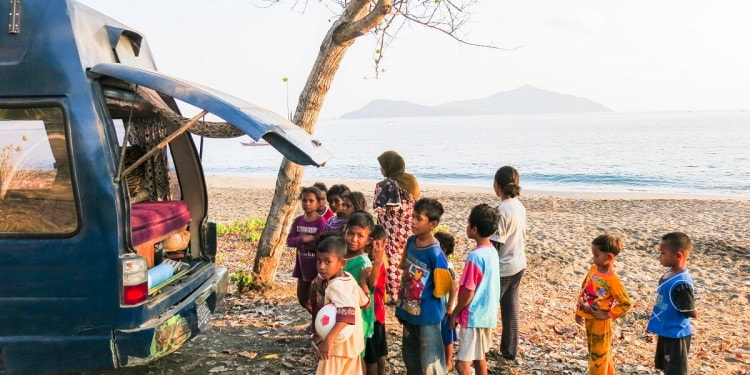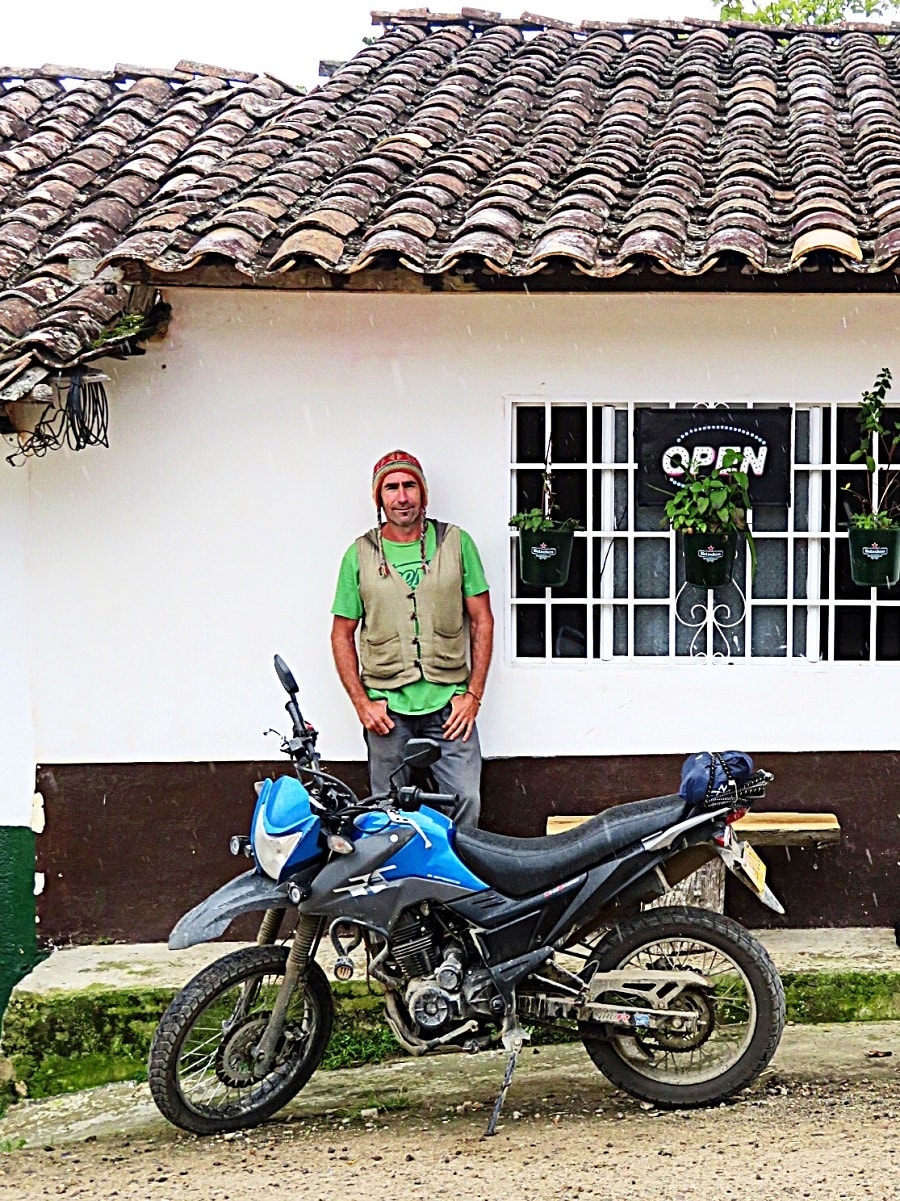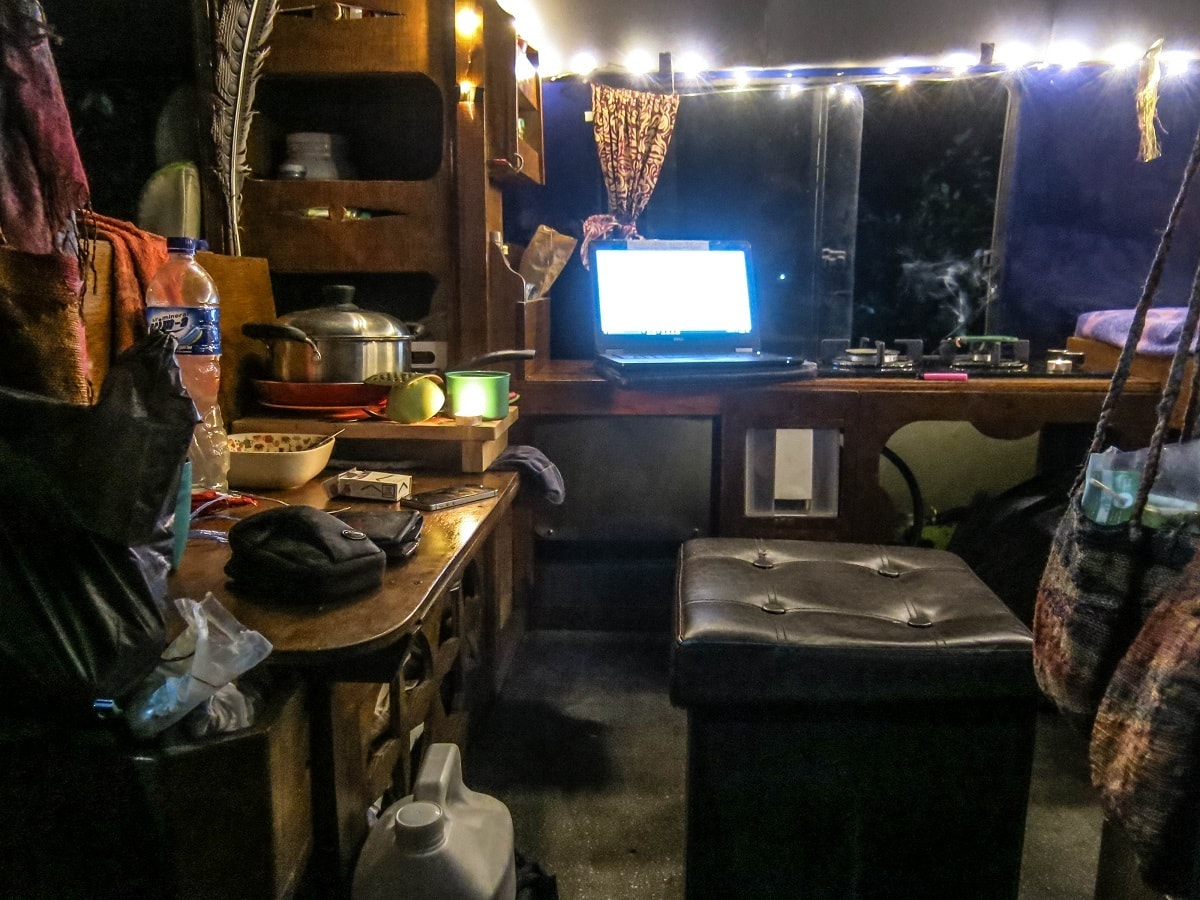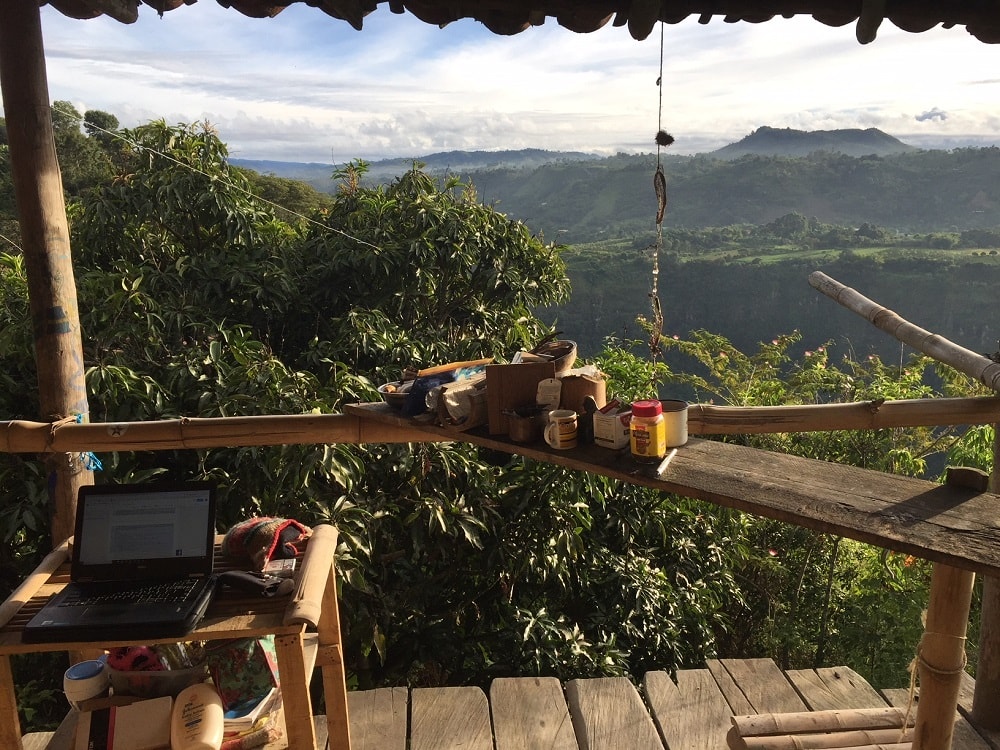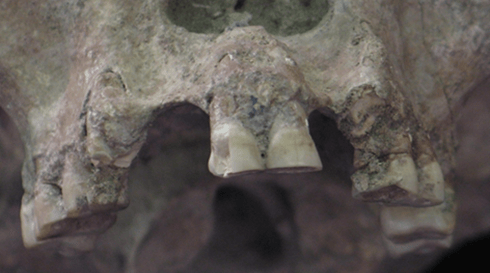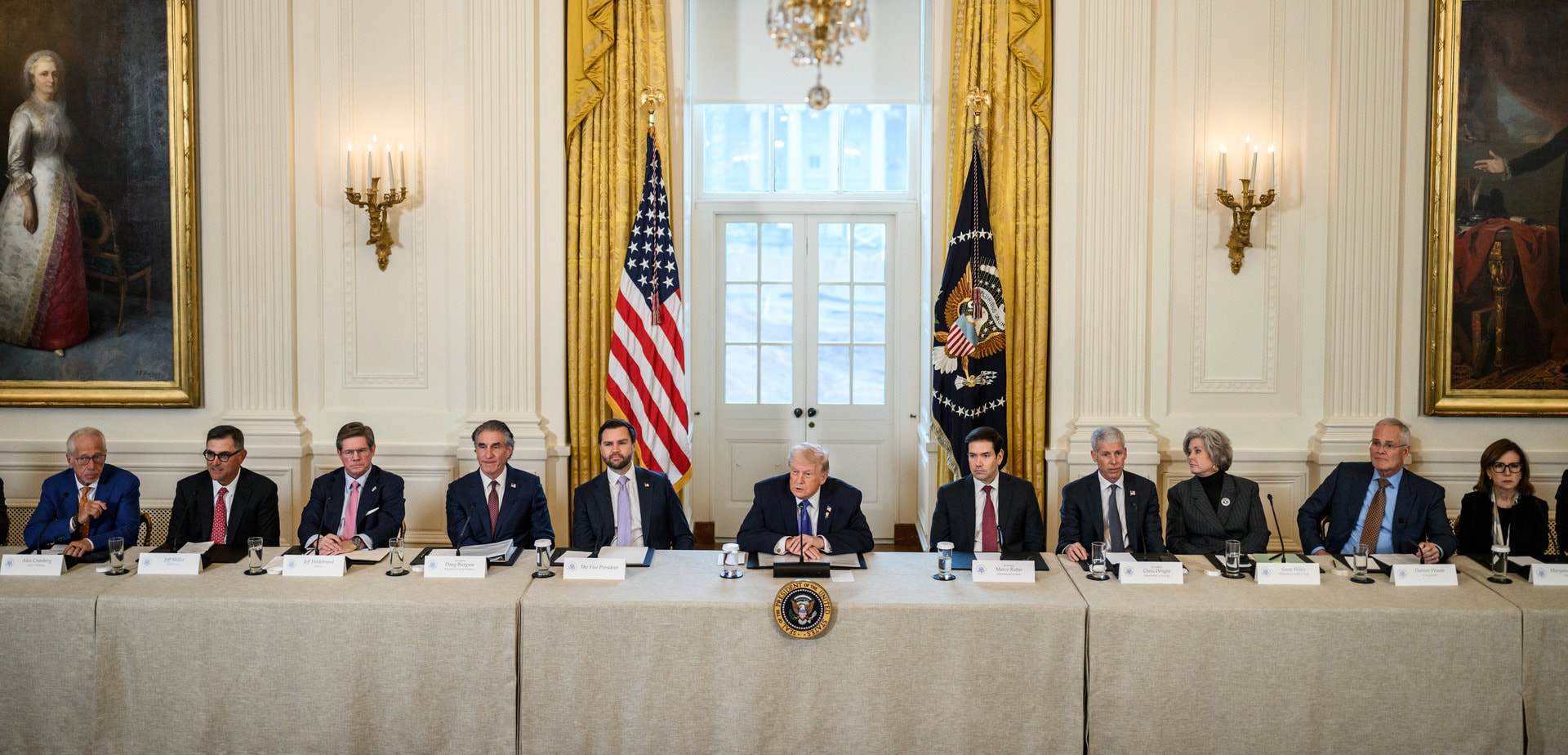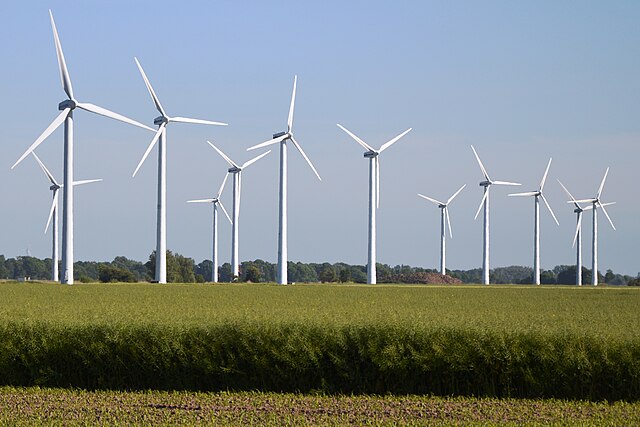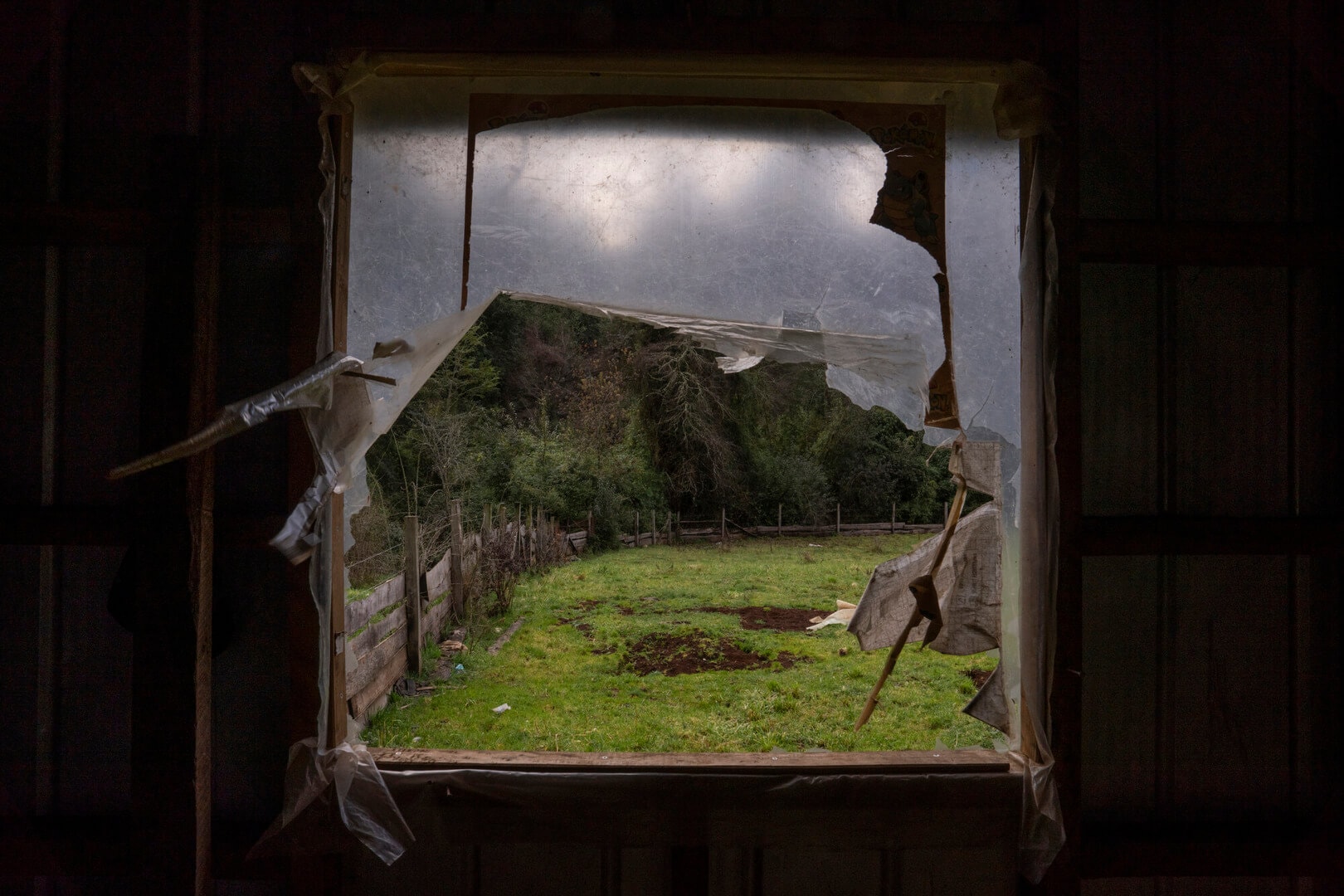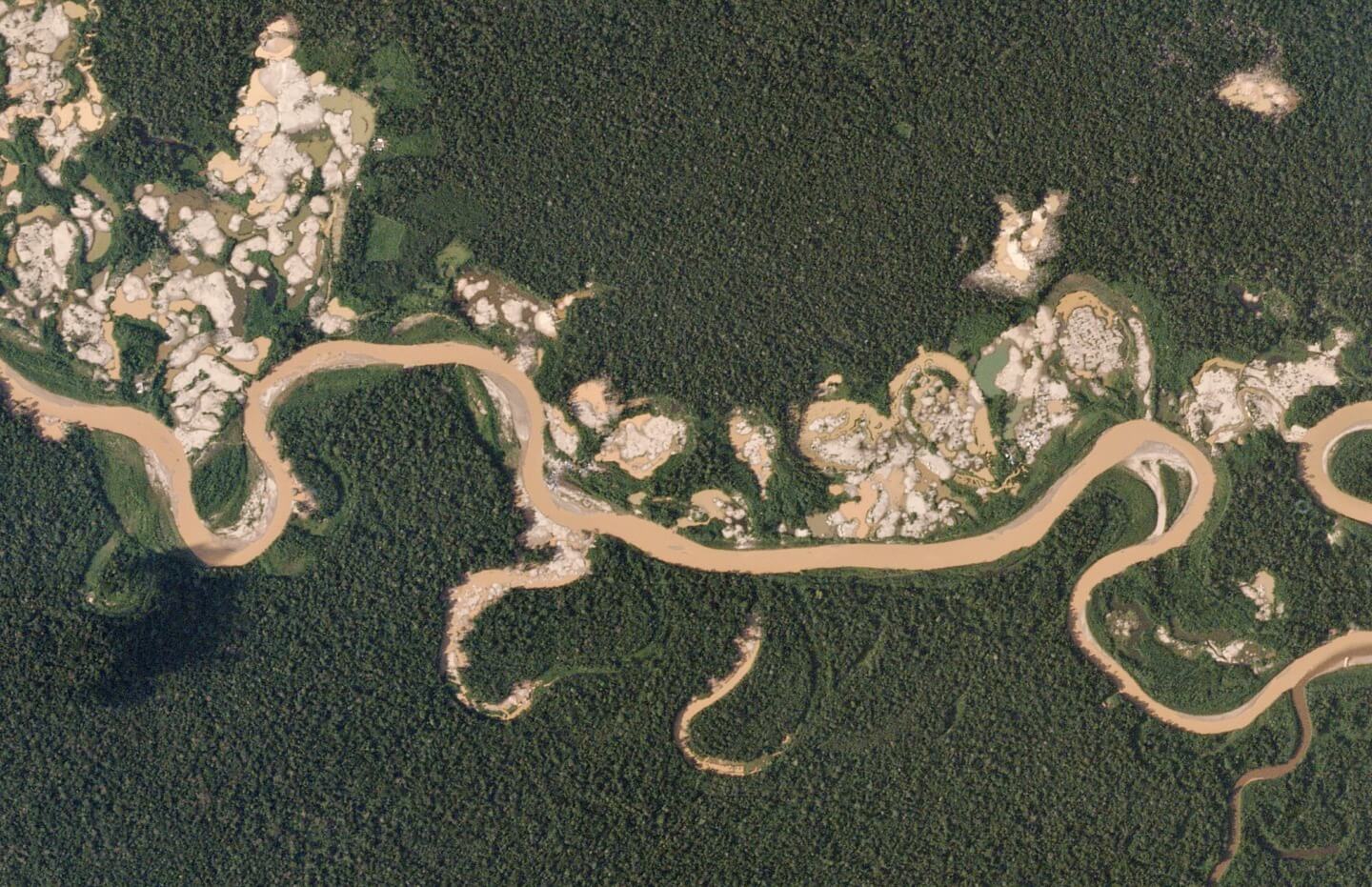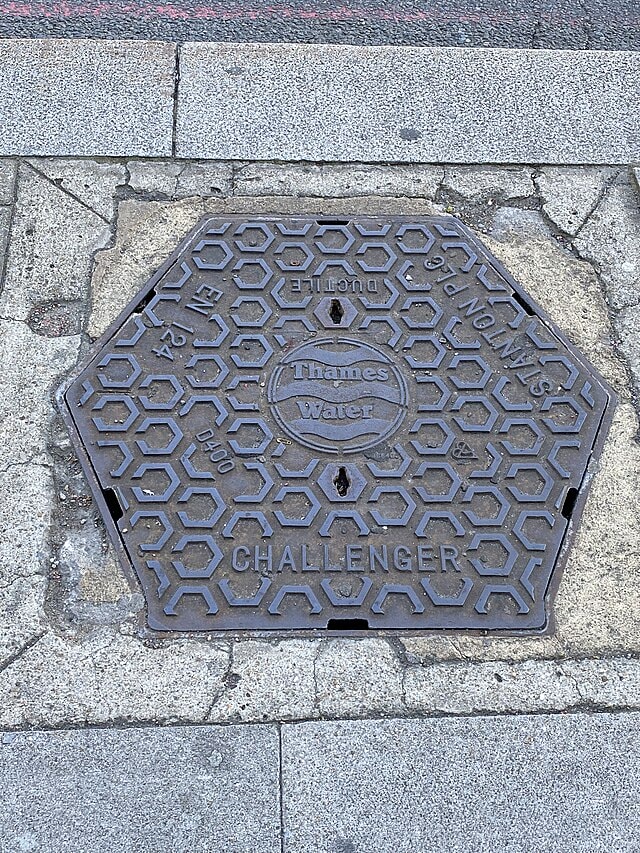Our industrial society, ever since it began, has spawned fierce critics. Two of the best known lived in America: the transcendentalist Henry David Thoreau and the economist Thorstein Veblen. Thoreau gave us the definitive masterpiece of life in the woods with Walden in 1854. Later, in 1899, Veblen became famous with his Theory of the Leisure Class, a savage critique of “conspicuous consumption” depicting businessmen as modern-day “lords of the manor”. Now, following in their footsteps, we have Michael Blue, a young Australian author who has just published his own addition to the Thoreau and Veblen legacy: The Anatomy of Escape .
Anatomy of Escape ,book cover. It features the bus named Rosie in which the author lived in Sumatra while writing his book.
This is Michael Blue’s second book, the first was The Consumption Cleanse published two years ago, with a long sub-title that said it all: “Giving up 13 consumption habits in 13 weeks for a better life and a healthier planet”.
The Anatomy of Escape, by contrast, is more ambitious. It is a crossover, partly memoir describing the high points of his own escape from the consumer society and partly guidebook telling his readers how to do it. In short, how to turn this kind of escape into a sustainable lifestyle.
Over the past year, Michael Blue has shared with Impakter several early drafts while writing his “escape” book. Choice pieces, like the explanation of why dogs always look happy (and cats don’t), the three-legged stool metaphor, or what we can learn from Easter Island.
I read the book and enjoyed it as much as I had enjoyed his articles for Impakter. But I wanted to know more. His desire to leave behind the consumer society in pursuit of happiness had always struck me as something out of the ordinary. It takes courage to abandon a career and choose to drift across the world.
When he wrote his articles for Impakter he was living in Indonesia, in an old bus converted into a house. Why do it? How to do it? His book provides answers, of course, but I still had more questions.
I got in touch with Mike and discovered that he had abandoned his bus.
He was now traveling across Colombia on a motorcycle, stopping now and then to write, nestling his computer in improbable places, including eagle nests with breathtaking views of the mountains. Eventually, we managed to have a long conversation that clarified many of my questions and doubts, here are the highlights.
Mike, I just finished your Anatomy of Escape and thoroughly enjoyed it. You have an original way to couch your ideas (e.g. the 3-legged stool! Dogs vs. cats!). It worked even in my case and that’s pretty amazing if you consider that I don’t really share your philosophy, at least not in full. While I share your distaste for the consumer society, I could never do what you’ve done, give up everything, leave behind home and family and live on the road. In short, drop out.
It might at first seem like that’s what I’ve done, drop out, but it wasn’t quite like that. I can see this clearly now in retrospect. Rather than dropping out, I feel like I have climbed out, out of the consumerism trap. And then I dropped in, if anything, to a life that I feel brings me so much more than it once did.
But climbing out of the “trap” as you call it, means giving up the lifestyle of the middle class, that I imagine you were born into. You are an accountant by profession, surely you had to give up a lot?
It did involve giving up a lot of things, but like giving up smoking, most of what I gave up has added to my quality of life. The main, maybe only exception is that my access to friends and family is more limited now. But that’s something I’m working on.
So, what did I give up? I gave up working for 50-60 hours a week under fluorescent lights in unfulfilling work and to the detriment of my health just to make lots of money for myself and the huge multinational corporations that I was ethically opposed to on environmental grounds.
I think many would sympathize with that but be thinking What about the money? In a way, this is one of the key psychological, or just plain logical things I work through in the book. That is, if you reduce the need for money, which we ALL can do without sacrifice (another key point in the book), unfulfilling work becomes less necessary, and we can instead focus on those things that truly make us happy. It is largely societal, economic and political shortcomings that keep us working and keep us ever-striving for more, and I think I unravel that paradigmatic brainwashing in the book.
In the photo: Working area in the bus (author image)
So you have “dropped into” another life that is more satisfying to you, I get that. But has the need for work disappeared? What role does “work” play in your new life?
I must first distinguish work that is fulfilling and enjoyable from work that exists purely because of systemic shortcomings around wealth distribution and the futile and unsustainable quest for more. The need for the latter has disappeared for me and my intention is to never do such work again. It is a rule I have made for myself, a strict rule that concurs with my beliefs on this. I want to practice as I preach. Once I understood that being frugal and practicing minimalism is not a sacrifice, but that consumerism and materialism in fact were, this became a whole lot easier.
With the other type of work, work that is enjoyable and fulfilling, I have no beef. If work finds me or I it, and it is adding something to the world, and I would likely do it without pay (my way of judging its value), then sure, I’d do it. I don’t call that work. In fact, as I write, I am considering a project in the Choco region of Colombia, where I am now, teaching English to disadvantaged school children. There is a stipend involved which is great, but not necessary.
But how do you solve the age-old problem of earning money just to eat and put a roof over your head. You still have to make a living, don’t you?
I don’t believe as a population we need to work nearly as much, indeed at all, in unfulfilling work. But given the systemic issues I mentioned above, how do I, as an individual to some extent bound by these systems, eat and house myself?
Supporting myself happens in two ways. Firstly, every month I seem to spend less money, through learning self-reliance, through sharing, exchanging skills, and through focussing on experiences instead of stuff. And then for the cash I do need (I don’t deny we all need cash), that comes decreasingly from savings I made when I was working, and increasingly from shortfall projects, which I talk a lot about in the book – essentially projects I enjoy, that also provide small but sufficient income.
In the photo: Sleeping quarters in the bus (author image)
This is not the first time that we disagree on the meaning of having a good life. I recall that we had a disagreement some time back when you sent me an article about how you got rid of everything you owned and you were down to 40 things. You had found that 40 was your ideal number. I suspect that my minimal number would be far greater!
I’d say we all could benefit in some way by having our own “40 Things”, but the number doesn’t need to be 40. 40 worked for me as I live on the road. My number will naturally be less than say, a householder. But the principle, not the number, is the important thing.
I own only 40 things as a hard rule and while that might sound militaristic, I am so convinced that less stuff is directly responsible for my happiness, my health and my prosperity, well, it cannot be a bad thing.
You see, aside from a rule, it is also a game. I get a kick out of finding solutions in life without buying things, being creative, using my hands and my brain instead of devices and appliances. And in addition to saving money, I don’t weigh on the environment as much. ALL things must at some point come from the earth and take up natural resources.
Very extreme! Your chosen lifestyle in this day and age of excessive consumerism is something I have deep sympathy with. When I was young (I’m a boomer), we all hated the treadmill of corporate life, and none of us were dreaming like millennials of launching “startups” and making money off the digital explosion à la Mark Zuckerberg, though I suppose you are a Generation X?
I am indeed a Gen Xer. I think there are certainly some good things to be said about the millennial way you describe, particularly in terms of lifestyle. Folks starting their own businesses, being creative, innovative, enjoying the thrill of creating something and having fun! I think it’s wonderful.
But I don’t think that it’s necessarily always good. Firstly, just because something is new, does not mean it’s better, or even good. Many startups are successful on account of masterful sales and marketing regimes, but one needs to look at the underlying product or service and ask if it is actually adding value to the world, considering the entire lifecycle of the product or service.
The other point here, is that if all of this is only a means to earn money, to live wastefully (pronounced destructively) through excessive consumerism, then I don’t really see it as having a lot of positives.
Does that sound too negative?
No, it’s not. Essentially, my starting point is the same as yours. But my ending point is not, and I’m afraid that’s where we can’t agree. For me, life is senseless if you don’t “serve” others. That sounds rather abstract and ridiculously “lofty” but it’s not. Consider the thousand+ ways one can serve. It’s not a matter of being a doctor or a nurse. That’s not what I mean (though being a doctor or a nurse is certainly one way to do it). The point is to make others happy and to “push forward” the human condition in a “better”, “happier” direction – and “pushing forward” can be done in so many ways! I feel that’s what I did when I worked in development aid at the UN. How do you position yourself on this? Somewhere at the end of the book, you mention “contribution” as a worthwhile pursuit…
My concept of contribution is the same as your “serving”. The point that I think is most worth discussing, is contribution in the context of self-interest, and the appearance that my living in this way is somehow selfish. Well, it is.
The first question here is, can you make others happy if you are not yourself happy? Or rather, would it be easier to make others happy, healthy or prosperous (the three important goals I talk about in the book), if you have not first figured them out for yourself?
I know that I am more interested in seeking these goals out for others, now that I recognise them in myself. Perhaps I surf and walk in the jungle a lot, and that can be seen as selfish. But when I am happy and healthy, I have a greater propensity to, as you say, ‘serve others’. It doesn’t come in the form of Aid or Development work as in your case, but in more subtle forms. I do a lot of non-structured voluntary work, be it teaching English to village kids or showing a villager some bamboo construction techniques. As you know I like to write articles and books, in all of which, my aim is to inspire folks to live in ways that are gentler on the planet. So, while it is not structured, I regularly find myself asking, am I contributing to a situation, am I having a positive impact here? And if I’m not, I tend to move on to something else.
The second question I discuss in the book, and one that I argued endlessly with my editor about, is if it is even possible for humans not to act out of self-interest. That is, are humans capable of genuine altruism. I’ll leave this one for the book because in it, I delve into it quite a lot. What I do know for sure, is that being happier and healthier and satisfied with what I have, I spent a lot more time and effort, seeking the same for others than I did four years ago when I was an unhappy wage slave ever seeking to have more.
No question, if one is unhappy in one’s own life, it is hard to “serve” others. Still, I find it difficult to see how a whole day surfing or watching the jungle wall can be equated with “happiness”. From where I stand, that is not happiness. Happy moments, yes, but not happiness. Not fulfillment. What is your take?
Throughout the book, happiness, along with health and prosperity are what I seem to be seeking. I talk about happiness quite a lot and discover that contribution is one of the four elements in my happiness ‘formula’, the others being growth, creativity and connection. I learn throughout my four failed escape attempts to South America that fulfilment spans all of these.
Contribution we have already touched on. As for growth, with the time to entertain it these days, I find I am always learning how to do things for myself. Whether it be mechanical work on my bus, food sourcing and preparation, learning languages, aspects of health, building, you name it. I’m currently honing my bamboo building skills. I fancy building myself a little home in the jungle one day, using only bamboo and hand tools.
Creativity ties in somewhat with growth, but it also includes things that I never dreamed I would be doing when I was an inmate of the work-consume-die institution. I fiddle around with a ukulele these days, much to many people’s’ distress, I write a lot, draw and am trying to get my two left feet to dance salsa. They currently seem to have little interest.
Connection is the one that I struggled with for some time, due to the distance between myself and my friends and family. But I’m still working on this, both practically and philosophically. I’ll leave the long discourse on connection to the book.
Can you bring us up-to-date, what comes next? Why did you leave your bus in Indonesia and why are you traveling in Colombia? Do you plan to settle there? You also mentioned you are working on a new book, can you give us a hint, what will it be about?
A few months ago, I sold my bus and left my life in Indonesia, effectively swapping it for a ticket to Colombia and a motorbike. Sumatra is amazing, but I felt I needed a change. As a microcosm of my escapes in general, it was much more about going TO Colombia than FROM Indonesia.
In the photo: One of Michael Blue’s writing places in Colombia, facing the mountains (author image)
In addition, I have many friends here from past visits and aside from it being the perfect place to finally nail salsa dancing, I will build a little bamboo home in the jungle here.
And to give you a little hint, those projects, along with my usual philosophical angle, are all likely to feature in my next book – possibly a fiction!
EDITOR’S NOTE: THE OPINIONS EXPRESSED HERE BY IMPAKTER.COM COLUMNISTS ARE THEIR OWN, NOT THOSE OF IMPAKTER.COM
Featured Image: Kids gathering around the back of Michael Blue’s bus, as they always did whenever he stopped (Indonesia). All images by Michael Blue.


